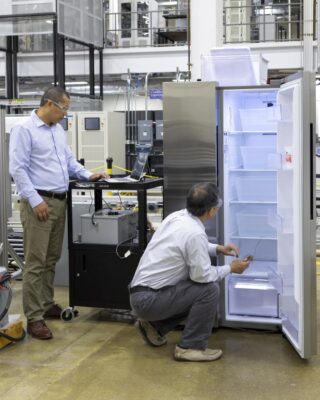Sign up for daily news updates from CleanTechnica on email. Or follow us on Google News!
A technology developed by Oak Ridge National Laboratory works to keep food refrigerated with phase change materials, or PCMs, while reducing carbon emissions by 30%.
More than 100 million household refrigerators in operation across the United States consume up to 2 kilowatts of electricity daily. These refrigerators contribute to energy consumption and carbon emissions by using compressors that cycle on and off day and night, pumping refrigerants across evaporator coils to maintain low-temperatures for fresh and frozen compartments.

ORNL’s innovation uses advanced evaporators with PCMs installed in each compartment for cold energy storage. PCMs are useful for heating and cooling because they store and release energy when changing from solids to liquids or vice versa. Researchers applied porous metals, direct-contact defrosting technology and a refrigerant with low global warming potential to enhance performance and minimize environmental impact.
“PCMs are integrated with evaporator coils to keep temperature constant, requiring one operating cycle and allowing refrigerators to operate almost 100% at nighttime, when energy use is lower,” ORNL’s Zhiming Gao said. “This reduces electricity demand, saves costs and maintains efficiency.”
Learn more about this technology:
Novel Efficient Refrigerator with Cold Energy Storage Enabling Demand Flexibility
Household refrigerators typically consume 1.5–2.0kWh of electricity per day, and more than 100 million refrigerators are used in US homes, resulting in significant primary energy consumption and carbon emissions. This technology is a novel household refrigerator that uses advanced evaporators with phase change material (PCM)–based long-duration cold energy storage, PCM heat conduction enhancement using a metal foam material, direct-contact defrosting technology, and a low global warming potential (GWP) alternative refrigerant, enabling efficiency improvement in excess of 20% and peak load shifting.
Description
This technology is a novel refrigerator proposed to replace 100 million current refrigerators in the U.S. It uses advanced evaporators with phase change material (PCM)–based long-duration cold energy storage, PCM heat conduction enhancement using a metal foam material, direct-contact defrosting technology, and a low global warming potential (GWP) alternative refrigerant to achieve flexible load demand management and transformational efficiency improvement in excess of 20%. This will enable a 30% reduction in CO2 emissions and almost 100% load shift from daytime to nighttime operation. The PCM is organic based and can be integrated with evaporator coils and keep temperature constant for fresh and frozen food. It only requires one cycle on, and one cycle off, unlike current technology that cycles on and off repeatedly throughout the day. Replacing all conventional refrigerators in homes and commercial buildings with the proposed novel refrigerator would save up to 167 TBtu of primary energy consumption and reduce CO2 emissions by 7.2 million tons. This replacement would directly support a smooth transition toward meeting the ambitious goals of net-zero carbon emissions by 2050 while creating millions of clean energy jobs. Additionally, the novel refrigerator’s load shifting capability enables approximately 0.7%–1.0% of daytime electricity demand to be shifted to nighttime operation nationwide.
Benefits
- Sustainable, achieves 30% reduction in carbon dioxide emissions
- Efficiency improvement achieves reduced energy needs greater than 20%
- Almost 100% load shift from daytime to nighttime operation, saving energy and costs
- Helps achieve goal of net-zero carbon emissions by 2050
Applications and Industries
- Refrigeration, residential and commercial
- Transportation refrigeration
RESEARCHERS: Zhiming Gao, Kashif Nawaz. Mingkan Zhang
Images & article courtesy of ORNL, U.S. Department of Energy
Have a tip for CleanTechnica? Want to advertise? Want to suggest a guest for our CleanTech Talk podcast? Contact us here.
Latest CleanTechnica.TV Videos
[embedded content]
[embedded content]
Advertisement
CleanTechnica uses affiliate links. See our policy here.
- SEO Powered Content & PR Distribution. Get Amplified Today.
- PlatoData.Network Vertical Generative Ai. Empower Yourself. Access Here.
- PlatoAiStream. Web3 Intelligence. Knowledge Amplified. Access Here.
- PlatoESG. Carbon, CleanTech, Energy, Environment, Solar, Waste Management. Access Here.
- PlatoHealth. Biotech and Clinical Trials Intelligence. Access Here.
- Source: https://cleantechnica.com/2024/05/26/less-carbon-more-chill-novel-refrigeration-approach-uses-pcms-to-freeze-cool-perishables/




